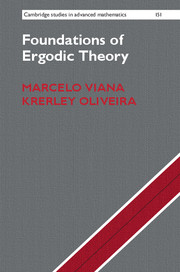Book contents
- Frontmatter
- Contents
- Preface
- 1 Recurrence
- 2 Existence of invariant measures
- 3 Ergodic theorems
- 4 Ergodicity
- 5 Ergodic decomposition
- 6 Unique ergodicity
- 7 Correlations
- 8 Equivalent systems
- 9 Entropy
- 10 Variational principle
- 11 Expanding maps
- 12 Thermodynamic formalism
- Appendix A Topics in measure theory, topology and analysis
- Hints or solutions for selected exercises
- References
- Index of notation
- Index
11 - Expanding maps
Published online by Cambridge University Press: 05 February 2016
- Frontmatter
- Contents
- Preface
- 1 Recurrence
- 2 Existence of invariant measures
- 3 Ergodic theorems
- 4 Ergodicity
- 5 Ergodic decomposition
- 6 Unique ergodicity
- 7 Correlations
- 8 Equivalent systems
- 9 Entropy
- 10 Variational principle
- 11 Expanding maps
- 12 Thermodynamic formalism
- Appendix A Topics in measure theory, topology and analysis
- Hints or solutions for selected exercises
- References
- Index of notation
- Index
Summary
The distinctive feature of the transformations f : M → M that we study in the last two chapters of this book is that they expand the distance between nearby points: there exists a constant σ >1 such that
d(f(x), f(y)) ≥ σd(x, y)
whenever the distance between x and y is small (a precise definition will be given shortly). There is more than one reason why this class of transformations has an important role in ergodic theory.
On the one hand, as we are going to see, expanding maps exhibit very rich dynamical behavior, from the metric and topological point of view as well as from the ergodic point of view. Thus, they provide a natural and interesting context for utilizing many of the ideas and methods that have been introduced so far.
On the other hand, expanding maps lead to paradigms that are useful for understanding many other systems, technically more complex. A good illustration of this is the ergodic theory of uniformly hyperbolic systems, for which an excellent presentation can be found in Bowen [Bow75a].
An important special case of expanding maps are the differentiable transformations on manifolds such that
∥Df(x)v∥ ≥ σ∥v∥
for every x ∈ M and every vector v tangent to M at the point x. We focus on this case in Section 11.1. The main result (Theorem 11.1.2) is that, under the hypothesis that the Jacobian detDf is Hölder, the transformation f admits a unique invariant probability measure absolutely continuous with respect to the Lebesgue measure. Moreover, that probability measure is ergodic and positive on the open subsets of M.
In Section 11.2 we extend the notion of an expanding map to metric spaces and we give a global description of the topological dynamics of such maps, starting from the study of their periodic points. The main objective is to show that the global dynamics may always be reduced to the topologically exact case (Theorem 11.2.15). In Section 11.3 we complement this analysis by showing that for these transformations the topological entropy coincides with the growth rate of the number of periodic points.
The study of expanding maps will proceed in Chapter 12, where we will develop the so-called thermodynamic formalism for such systems.
- Type
- Chapter
- Information
- Foundations of Ergodic Theory , pp. 352 - 379Publisher: Cambridge University PressPrint publication year: 2016



